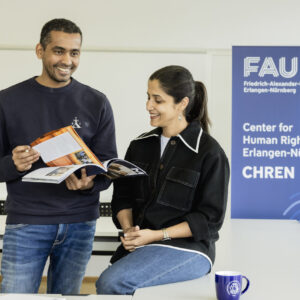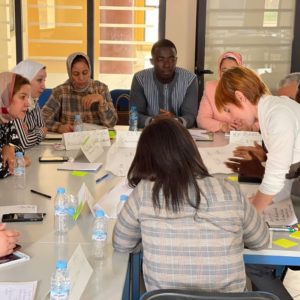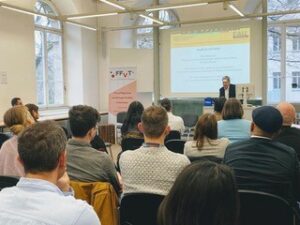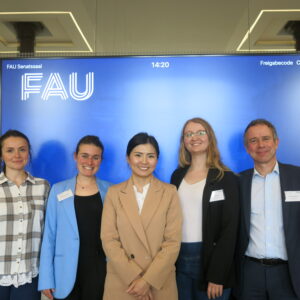In addition to the FAU Studien für Menschenrechte, the Interdisciplinary Studies in Human Rights and the Zeitschrift für Menschenrechte, the members of CHREN regularly publish various articles on the subject of human rights.
IDP Business and Human Rights

The program “Business and Human Rights: Governance Challenges in a Complex World” founded by the Elitenetzwerk Bayern creates an inter- and transdisciplinary research forum for excellent doctoral projects that deal with practical problems and theoretically sound questions in the field of business and human rights.
With currently 20 doctoral students, CHREN contributes to a unique research environment for early career researchers.
Equal Partnerships

The project “Equal Partnerships – African Intermediary Cities as Actors and Partners in Urban Migration Governance” explores the opportunities and challenges of collaborative, urban migration governance in African intermediary cities. Through participatory research, workshops, and networking formats, we bring together local, national, and international actors to develop practical impulses and policy recommendations for multi-stakeholder partnerships.
FFVT

The collaborative project “Forced Migration and Refugee Studies: Networking and Knowledge Transfer” (FFVT) aims to strengthen interdisciplinary research on forced migration and refugees in Germany. To this end, the project, which is funded by the German Federal Ministry of Education and Research (BMBF), brings together research on migration, development, conflict and violence, climate change, health, governance and human rights, and other topics. In this way, FFVT supports the networking of researchers and institutes working in all relevant fields of research dealing with forced migration. CHREN cooperates on this collaborative project with the Institute for Migration Research and Intercultural Studies (IMIS) at the University of Osnabrück, the Bonn International Center for Conversion (BICC), and the German Development Institute (DIE) in Bonn.
Gesundheit! Inclusion in the Nursing and Care Sector

The project “Gesundheit! Inclusion in the Nursing and Care Sector” is funded by the Mercator Foundation and is based at CHREN. Against the backdrop of an increasing need for personnel in the health and care sector and ever more frequent gaps in care, it is already impossible to imagine life without workers from abroad. Their recruitment and, above all, sustainable employment depends to a large extent on working conditions and their professional and social participation. The new research project addresses this issue and aims to identify good conditions for precarious workers with a history of migration in the health and care sector in order to strengthen their orientation towards staying.
Homepage Project “Gesundheit! Teilhabe am Gesundheits- und Pflegesektor”
News:

On 16 May, 6 June, and 27 June, the online event series “Care beyond borders: Exploring impacts of migration, displacement and inclusion for the care and nursing sector” will take place, which will deal with the topics of migration, displacement, and integration in the care sector from a scientific perspective – and address the associated challenges and potentials.
The international and interdisciplinary series of events will initially offer the opportunity to discuss current scientific research on three one-hour evening sessions in May and June. In the first session on Thursday, 16.05.24, we would like to take a fundamental look at the topic of care migration, economic assessment, and categorization practices as well as individual effects. Then, on 6 June, we will look at the employment of refugees in the care sector in Germany and questions of inclusion and exclusion. The third and final session of the summer semester on Thursday 27 June will focus on diversity in everyday nursing care. Further sessions are being planned for the winter semester.
The series takes place in cooperation with two projects of the FAU Center for Human Rights at the Friedrich-Alexander University of Erlangen-Nuremberg: The Stiftung Mercator-funded research project “Health! Participation in the care sector” aims to identify good working and living conditions for employees with a history of migration in the care sector and generate impulses and recommendations that promote equal participation and equal opportunities in institutions and the region. The joint project “Flight and Refugee Research: Networking and Transfer” (FFVT), funded by the Federal Ministry of Education and Research (BMBF), aims to strengthen interdisciplinary flight and refugee research in and outside Germany.
To register, please use the following link. Please note that the event will be held in English. If you have any questions, please contact Yasemin Bekyol (yasemin.bekyol@fau.de).
Information on the speakers and content of the individual events can be found here.
Yasemin Bekyol, Petra Bendel, Stefan Kordel, Tobias Weidinger und Edanur Yarar (2023). „Systemrelevant, aber systematisch benachteiligt: zur Teilhabe von Geflüchteten als Arbeitskräfte im Gesundheitssektor“. Impulse für Gesundheitsförderung der Landesvereinigung für Gesundheit und Akademie für Sozialmedizin Niedersachsen Bremen e.V.. 120: 19. available: https://www.gesundheit-nds-hb.de/impulse/

In March 2023 the hybrid conference „Systemrelevant und systemisch benachteiligt? (Flucht-)Migration und Gesundheit: Zugang, Teilhabe und Beschäftigung“ on migration and health care took place at FAU Kollegienhaus. Purpose of this scientific and practice-oriented event was to address the multifaceted role of people with a migration background in Germany – both as recipients of health care services as well as employees in the health sector – and the challenges and potentials associated with these roles.
The conference documentation (PDF / in German) is now available for download. Some of the recorded presentations and panel discussions can be accessed here (in German).
This two-day conference was organized by the project “Forced Migration and Refugee Studies: Networking and Knowledge Transfer (FFVT)” funded by the German Federal Ministry for Education and Research (BMBF) as well as the Stiftung Mercator-funded project “Gesundheit! Inclusion in the healthcare sector” at the Center for Human Rights Erlangen-Nuremberg (CHREN) at Friedrich-Alexander University of Erlangen-Nuremberg.
Match’In

This project is dedicated to the development of a new mechanism for the distribution and allocation of refugees and asylum seekers from the federal states to the municipalities. To this end, the University of Hildesheim and the Friedrich-Alexander University of Erlangen-Nuremberg are cooperating with federal states, municipalities, and representatives of refugees. A specially developed algorithm will consider both the individual requirements and needs of those seeking protection on the one hand and the existing structures and resources of the municipalities on the other to achieve a better alignment (“matching”). This shall help to better address the needs of persons seeking protection, to utilize the potential of migration for municipal development, improve integration and participation, and reduce secondary migration. The project is funded by Stiftung Mercator.
OECD Case Law

The project will examine the OECD case law relating to corporate human rights responsibility to draw a better understanding of the NCPs decisions on meeting the human rights requirements, including the corporate human rights due diligence (HRDD) and access to remedy illustrated under the UN Guiding Principles on Business and Human Rights (UNGPs). In addition, it will investigate the role of NCPs in contribution to the development of the international legal requirements that multinational enterprises are expected to follow to respect human rights in their operations.
Quellen zur Geschichte der Menschenrechte

The academic portal Quellen zur Geschichte der Menschenrechte was launched in 2015 by the Fritz Thyssen Foundation’s Working Group on Human Rights in the 20th Century (2012-2020), which was responsible for the content until May 2020. Since then, the project has been based at the Center for Human Rights Erlangen-Nuremberg (CHREN). It brings together biographical interviews and commentaries that reflect on the development of human rights since the 20th century in a historicising way. The focus is on national and international actors, concepts, and practices: In what ways and with what motives did and do various groups and individuals drive the setting of human rights norms? What practices emerge from this? What role do arenas such as the UN, the European Court of Human Rights or the International Criminal Court play? What justifications are used by supporters and opponents of human rights?

The biweekly CHREN ECR (early career researchers) Brown Bag Lunch series focus on peer-to-peer dialogue, networking and initiating collaborations as well as exchanging ideas on research-related and career-oriented issues. (Post)doctoral researchers take turns in presenting a topic, idea or project of their choice. Everything presented is work in progress. Brainstorming processes are explicitly encouraged. More senior colleagues are invited to attend and contribute – but early career researchers are the protagonists of this event series.
The CHREN Colloquium is a networking and exchange format in which CHREN members discuss their research and/or pressing current issues in world affairs. About once a month, during the lecture period, CHREN members and interested students and colleagues from other fields come together for an hour and a half in Erlangen.
Together with the FAU Interdisciplinary Human Rights Research Collective and the CHREN ECR Brown Bag Lunches, the CHREN Colloquium contributes to networking and academic exchange among the members and staff of FAU CHREN – and beyond. The colloquium is both a place for dialogue and a platform for initiating joint research projects.
New International Courses in Winter Semester 2025/26

Call for Papers: New Technologies and Human Rights

New Book: „Menschenrechte nach der Zeitenwende“ – Prof. Heiner Bielefeldt in Conversation

Human Rights Colloquium: Dr Oluwatoyin Adejonwo on Just Transition, Social Protection and Climate Justice

Human Rights Colloquium: Dr Andrew Chubb on Transnational Repression

Human Rights Colloquium: Opening Session by Dr. Tainá Garcia Maia

Save the date: Evening Lecture with Harvard professor Dr Kathryn Sikkink

“Transforming Human Rights”: New Cluster of Excellence

“Match’In” Pilot Project: Policy Paper on the Results Published

Welcome to the team: CHREN Visiting Research Fellow Dr. Oluwatoyin Adejonwo



